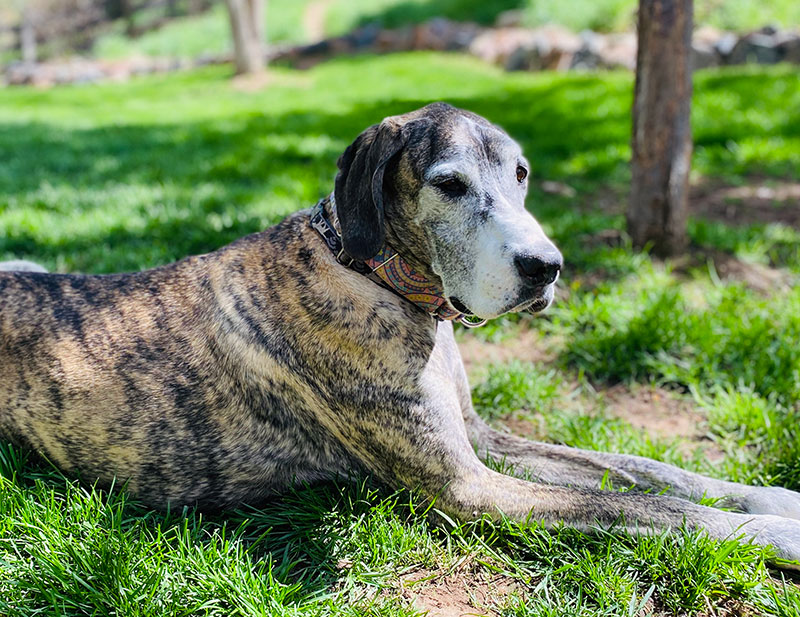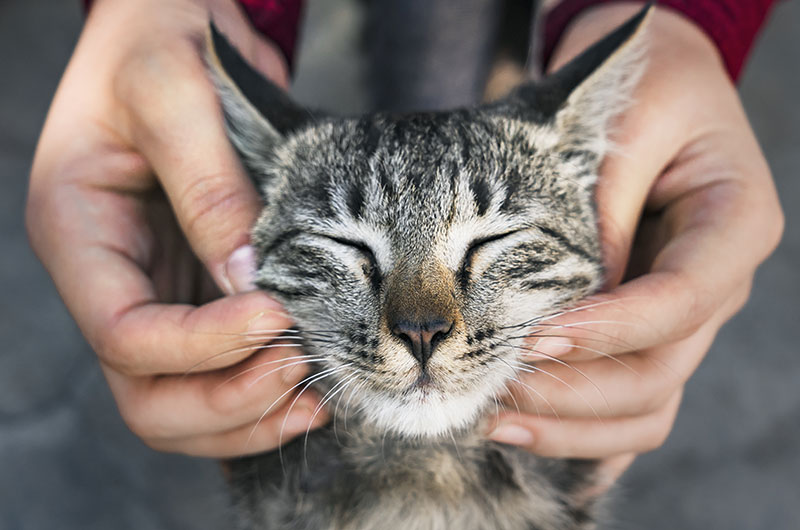Senior Cat and Dog Care
At Altitude Animal Hospital, we want to assist you in helping your beloved cat or dog live their longest, healthiest, and most comfortable life.
Your senior pets have been there with you through it all, and you’ve loved them since they came into your life. Your senior pets have been there with you through it all, and you’ve loved them since they came into your life. But as their bodies age, you may see a variety of changes – some subtle and some more obvious – that may require different care than you’re used to. Below is a list that we’ve compiled of some of the more common ailments that we see affecting our senior pet patients:

Joint Pain and Arthritis
Signs of joint pain can often be subtle. We may notice an obvious limp or pain, but arthritis pain can come on slowly over time.
Behavior Changes in Pet
Dogs
- Slowing down on walks
- Stiffness getting up from their nap
- Pacing
- Trouble getting comfortable
- Whining/whimpering at night
- Inappropriate panting
- Limbs trembling or trouble lowering for urination/defecation
- Slow movement on stairs
Cats
- Stiffness getting up from nap
- Hiding
- Reluctance to jump on/off furniture
- Not grooming as frequently, leading to more hair mats
- Urinating/defecating outside of litterbox
- Reluctance to be petted/touched
Home Management for Arthritis
Dogs
- Weight management – keeping our pets lean helps to ease the burden on their joints
- Exercise that is easy on their joints – walks on good surfaces, swimming, etc.
- Environmental assistance – ramps and stairs to help on/off furniture, elevation of food and water dishes
- Traction help – area rugs/runners on hard floors, HelpEmUp harness, ToeGrips
Cats
- Weight management – keeping our pets lean helps to ease the burden on their joints
- Placing food and water dishes in locations that do not require jumping or climbing
- Providing multiple options for drinking, including water dishes on every level of the home
- Litter box maintenance – (boxes with lower sides, creating an entrance cut out into the side of the litter box, litter boxes on every level of the home)
- Environmental assistance – stairs and boxes to help cat reach desired elevations
Behavior Changes in Pet
Dogs
- Slowing down on walks
- Stiffness getting up from their nap
- Pacing
- Trouble getting comfortable
- Whining/whimpering at night
- Inappropriate panting
- Limbs trembling or trouble lowering for urination/defecation
- Slow movement on stairs
Cats
- Stiffness getting up from nap
- Hiding
- Reluctance to jump on/off furniture
- Not grooming as frequently, leading to more hair mats
- Urinating/defecating outside of litterbox
- Reluctance to be petted/touched
Home Management for Arthritis
Dogs
- Weight management – keeping our pets lean helps to ease the burden on their joints
- Exercise that is easy on their joints – walks on good surfaces, swimming, etc.
- Environmental assistance – ramps and stairs to help on/off furniture, elevation of food and water dishes
- Traction help – area rugs/runners on hard floors, HelpEmUp harness, ToeGrips
Cats
- Weight management – keeping our pets lean helps to ease the burden on their joints
- Placing food and water dishes in locations that do not require jumping or climbing
- Providing multiple options for drinking, including water dishes on every level of the home
- Litter box maintenance – (boxes with lower sides, creating an entrance cut out into the side of the litter box, litter boxes on every level of the home)
- Environmental assistance – stairs and boxes to help cat reach desired elevations
How Altitude Animal Hospital can help manage your pet’s pain
We can help you with managing your pet’s medication, nutritional supplements, and supportive care. We offer laser therapy, joint supplements to help with arthritis, pain medications tailored to your pet’s needs, and other considerations.
Cognitive Disorders, Anxiety, and Behavior Changes
You may start to notice changes in your pet’s behavior as they age. These changes often happen slowly over time, and can include confusion, getting lost in the house, increased vocalizations, crying out at night, pacing, and agitation, among others. Signs of these changes usually come on slowly over time.
Home management for cognitive disorders, anxiety, and behavior changes
- Creating consistency for your pet’s routine
- Pheromone sprays to help your cat or dog relax
- Thundershirts and similar items to help your pet feel comforted
- Sound machines to help distract or block out scary sounds
- Enrichment games (brain puzzles for pets)
How Altitude Animal Hospital can help
Sometimes a supplement is the right choice and other times medications may work best to help your pet’s anxiety. We can help you choose the right supplements or medications to help your pet.
Renal Disease
Clinical signs
Increased thirst or urination are often the first noticeable symptoms of possible renal (kidney) disease in pets, although these changes can sometimes be missed. Other clinical signs of renal disease may include lethargy, vomiting, inappropriate urination, weight loss, and loss of appetite.
Diagnosis and testing
When treating kidney disease, early diagnosis is best. We recommend annual lab testing on all pets over the age of seven; ideally, over the age of four. We do a combination of urine, blood pressure and blood tests to assess your pet’s kidney function. These tests also allow us to assess the function of your pet’s other internal organs.
Management
After a diagnosis of kidney disease, we will discuss with you the appropriate course of action for your pet. This may include a diet change and the addition of supplements and medications as necessary. We will continue to monitor your pet’s renal function, assessing their response to diet changes or medications, and adjusting their care as needed.
Altitude Animal Hospital
Excellence in Veterinary Care for Dogs & Cats…and the People Who Love Them
Cancer
Possible clinical signs
Cancer in pets comes with a range of clinical signs. Sometimes it can be an obvious lump or bump on your pet or the signs may more subtle depending on the location of the cancer.
- Decreased appetite
- Lethargy
- Hiding
- Poor interaction with family
- Cough
- Pain
Diagnosis and management
If you find a lump or bump on your pet, we will start with an exam, and potentially a Fine Needle Aspirate or biopsy. A Fine Needle Aspirate can be done while your pet is awake and just involves us poking the bump with a needle. This procedure allows us to look at the cells in the growth to identify the lesion. Biopsies can involve removing a small portion of the growth or removing the entire growth for evaluation. Once we know what type of growth your pet has, we can development a treatment plan.
Other cancers in pets can be internal and less obvious. X-rays, blood tests, and an abdominal ultrasound can give us information about how things are functioning inside of your pet.
Cancer treatments will vary depending on the type of cancer your pet has. Sometimes cutting out, or excising, is the only treatment needed. Other times more aggressive treatments like chemotherapy or radiation are necessary.
Heart Disease
Clinical signs
Heart disease can develop at any stage in a pet’s life but is often seen in senior pets. The clinical signs of heart disease in your pet may include coughing, increased respiratory effort or panting, and lethargy.
Diagnosis and management
A thorough physical exam can often alert us to a problem with your pet’s heart. Often we will hear a problem with the heart when we listen to it with a stethoscope. If we detect a problem we will consult with a board-certified veterinary cardiologist for the best next steps, which may include an appointment with a mobile cardiologist at our facility or referral to a specialty practice. If your pet is diagnosed with heart disease, we will develop a treatment plan.
Loss of Hearing and Vision
Clinical signs
- Bumping into furniture
- Trouble finding the food and water dish
- Agitation
- Behavioral changes
- Trouble navigating in the dark (or low light)
- Not coming when called
- Confusion
- Reluctance to jump on or off furniture
Home management
- Keep furniture in same place
- Add stairs/chair/step stool to help with on and off furniture
- Improve lighting
Senior Pet Care Resources

